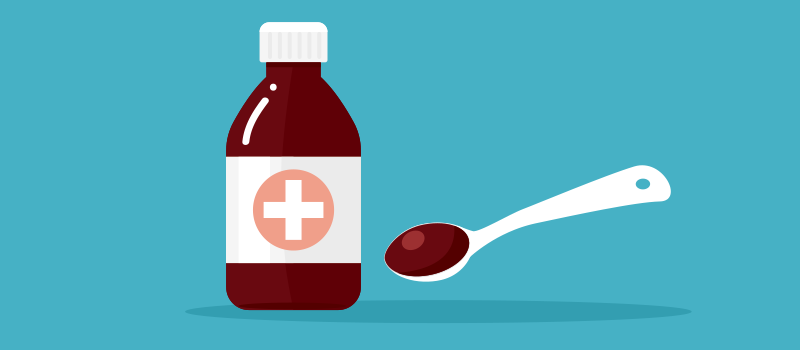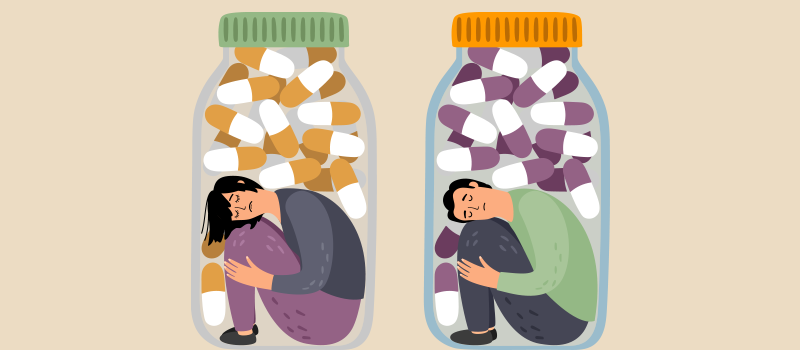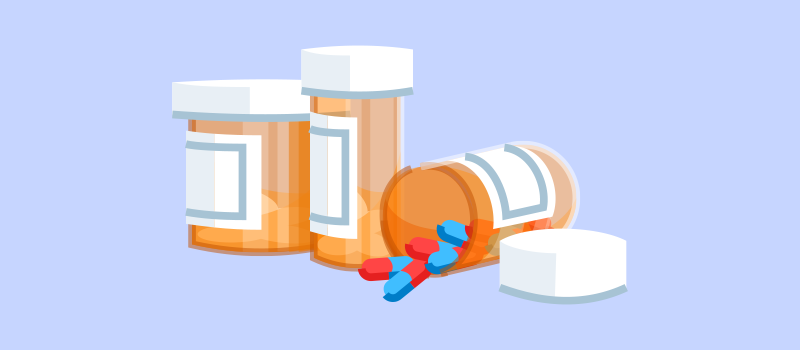What’s the Buzz
The Bee Healthy Blog
Common Questions About Cough Medicine Safety and Side Effects

A cough can make you feel miserable. It’s one of the most common symptoms that sends millions of people to the doctor every year. There are many OTC medicines (over-the-counter medicines) for cough and cold that you can buy without a prescription. But just how safe is a cough medicine?
Continue reading to get the answers to some common questions about the safety of cough and cold medicines. We’ll talk about the potential dangers of using OTC medicines, the rise in cough syrup abuse, particularly among teenagers, and what you can do to use over-the-counter and prescription medicines for cough responsibly.
What types of cough medicines are available? How do they work?
There are two main types of over-the-counter cough medicines—expectorants and antitussives. Expectorants cause thinning and loosening of mucus in your air passages. Guaifenesin is a common expectorant present in a lot of OTC cough and cold products. It is included in brand names of cough medicines like Robitussin Chest Congestion and Mucinex.
Antitussives are cough suppressants. They relieve coughs by suppressing the cough reflex in the brain. A common antitussive in OTC cough medicines is called dextromethorphan. It is present in brand names such as Robitussin Cough, Triaminic Cold and Cough, and Vicks 44 Cough and Cold.
Dextromethorphan and guaifenesin are sometimes present together in one cough medicine, for example, Robitussin DM. They are also frequently combined with other antihistamines, decongestants, and pain relievers. These combination products are designed to treat multiple symptoms of the common cold and flu simultaneously.
However, it is important to use OTC cough medicine with caution. For example, if your main symptom is cough, a product that contains an antihistamine can have a drying effect, resulting in thicker mucus that’s harder to clear, making your cough worse.
Are cough and cold medicines harmful?
Dextromethorphan is a common antitussive ingredient found in dozens of cough and cold remedies. This cough suppressant works well to stop coughing. However, it does not treat the underlying cause of the cough or speed up recovery.
Many people are not aware that dextromethorphan is a psychotropic substance, meaning it can affect how the brain works and alter your mood, thoughts, feelings, and behaviors. Dextromethorphan is not a controlled substance. However, misusing and abusing it can potentially lead to dependency and withdrawal symptoms.
Dextromethorphan-containing cough syrups are popular with teens who want a cheap, easy high. However, this drug abuse can be very dangerous. Besides the risks associated with dextromethorphan, cough and cold medicines also have other ingredients that can be harmful when consumed in large amounts. Moreover, combining high doses of dextromethorphan with alcohol can be life-threatening due to its respiratory depressant effect.
Is it safe to take cough medicine daily?
Generally, you should not take OTC cough syrup or other types of cough medicines daily for more than 7 days. Most OTC cough syrups are designed for short-term relief of cough. If you have a severe, persistent cough that does not improve after using OTC remedies for about a week, please get examined by a healthcare professional who would provide medical advice to you along with appropriate next step treatment.
Keep in mind that when used as directed, dextromethorphan products are safe and effective. There are minimal to no severe side effects associated with this medicine at small doses. However, it can cause dangerous side effects from hallucinations, loss of consciousness, seizures, brain damage, and even death with large doses.
Overuse of OTC cough syrup containing dextromethorphan can lead to short-term side effects like impaired judgment, sweating, lethargy, nausea, vomiting, and loss of motor coordination. It can also cause long-term side effects like fatigue and insomnia.
What precautions should I take while using OTC and prescription medicines for cough?
Here are some of the things you should keep in mind when using OTC or prescription cough and cold remedies:
- Discuss OTC medicines with your child’s doctor before giving them to your child. Do not give these products to young children under 4 years of age. For children of all ages, but especially those between 4 and 11, you should always ask the doctor first. Follow carefully the package directions or any medication guides provided to you. Products made for adults should not be given to children.
- To reduce the risk of misuse and abuse, do not buy extra OTC medicines and store them at home
- If you have a medical condition such as high blood pressure or heart disease, check with your doctor before using these products.
- See your doctor if your cough lasts longer than 5-7 days, if your cough goes away but comes back, or if you have other symptoms such as rash, fever, or headache. It could be something else like chronic bronchitis that would require prescription treatment.
- Don’t overuse cough and cold products. Check non-prescription cough and cold product labels carefully to see how much medicine you should take.
- Before buying more than one OTC cough and cold product, always check their active ingredients to ensure you are not taking multiple products with the same ingredients. Taking multiple products together can result in an overdose. This is especially important in children.
- Read the package instructions carefully. Do not take more than the recommended amount in a 24-hour period. Do not take extra doses if one dose does not work. If one dose doesn’t provide any relief from your symptoms, extra doses are not likely to provide the complete relief you’re looking for. Rather, you will put yourself at risk of an overdose.
- Many cough and cold medications are combination products that contain other medicines like antihistamines and decongestants. Pharmacists or family physicians can advise you on the best product for your symptoms.
- If you are taking a liquid cough and cold medicine, measure the dose using the measuring cup provided with the medication. Do not use a household spoon.
References:












SOCIAL